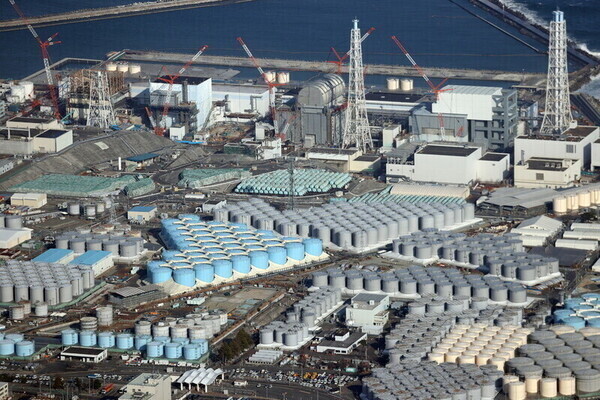hankyoreh
Links to other country sites 다른 나라 사이트 링크
[Editorial] Koreans’ panic buying of seafood is a cry for their fears about Fukushima to be taken seriously

Ahead of dumping radioactive water from the Fukushima nuclear meltdown, Japan has begun testing its equipment for the release; meanwhile, signs of panic buying of seafood products such as salt and dried fish are becoming evident. Anxious consumers have begun bulk-purchasing seafood that they can store for a long time, stocking up on them. Prices are reportedly surging as well.
According to Hankyoreh’s reporting on Tuesday, a small business owner who operates a restaurant in the Gwanak District of Seoul said, “Every morning when I wake up, I find out that the price for salt has risen by 5,000 won. Some online stores have already put up announcements that bay salt delivered directly from local producers in Shinan County is temporarily out of stock due to a flood of orders.” Bay salt prices soared by more than 40% in the past month, warranting news reports about one 20-kilogram bag selling for over 20,000 won (US$15.60).
Signs of panic buying of salt and dried fish should be seen as prompted by consumers acting independently to secure safe seafood before the wastewater is dumped. Once dumping begins in earnest, we worry that consumption of seafood that cannot be stored for long, such as fish and sashimi ingredients, may cease. Merchants and small business owners say fear and a sense of crisis are already growing among them.
The reason anxiety amongst the citizenry has multiplied instead of subsiding despite the government iterating again and again that the seafood is safe is because the authorities of South Korea and Japan have lost their trust. Japan originally argued that its radioactive wastewater processing system, which it calls the Advanced Liquid Processing System (ALPS), could eliminate almost every radioactive nucleotide excluding tritium. But it later acknowledged that the system can’t even filter 14C, the half-life of which is 5,730 years, and it was also exposed that wastewater processed by ALPS still contains radioactive substances over 70% of the safety threshold.
In the eyes of Koreans, this whole situation reads as the government having decided first and foremost to cooperate with Japan’s dumping of the water without carrying out any objective, detailed research or study. That’s why the dispatch of a Korean inspection team to Fukushima after the fact failed to quell any concerns.
If the government was putting consideration for the people’s lives and safety first, it should have demanded transparent data disclosures and access to facilities before anything else. But by forgoing all that and instead parroting the one-sided claim that the wastewater is perfectly safe, the government and ruling party are making the people’s anxiety all out to be the fault of scaremongering by the political opposition. This is irresponsible.
The Yoon administration and the ruling party should give careful thought to measures for restoring trust and dispelling fears among Koreans.
Browbeating the public won’t drive out distrust—it’ll only invite backlash.
Please direct questions or comments to [english@hani.co.kr]

Editorial・opinion
![[Editorial] Perilous stakes of Trump’s rhetoric around US troop pullout from Korea [Editorial] Perilous stakes of Trump’s rhetoric around US troop pullout from Korea](https://flexible.img.hani.co.kr/flexible/normal/500/300/imgdb/original/2024/0509/221715238827911.jpg) [Editorial] Perilous stakes of Trump’s rhetoric around US troop pullout from Korea
[Editorial] Perilous stakes of Trump’s rhetoric around US troop pullout from Korea![[Guest essay] Preventing Korean Peninsula from becoming front line of new cold war [Guest essay] Preventing Korean Peninsula from becoming front line of new cold war](https://flexible.img.hani.co.kr/flexible/normal/500/300/imgdb/original/2024/0507/7217150679227807.jpg) [Guest essay] Preventing Korean Peninsula from becoming front line of new cold war
[Guest essay] Preventing Korean Peninsula from becoming front line of new cold war- [Column] The state is back — but is it in business?
- [Column] Life on our Trisolaris
- [Editorial] Penalties for airing allegations against Korea’s first lady endanger free press
- [Editorial] Yoon must halt procurement of SM-3 interceptor missiles
- [Guest essay] Maybe Korea’s rapid population decline is an opportunity, not a crisis
- [Column] Can Yoon steer diplomacy with Russia, China back on track?
- [Column] Season 2 of special prosecutor probe may be coming to Korea soon
- [Column] Park Geun-hye déjà vu in Yoon Suk-yeol
Most viewed articles
- 1Korea likely to shave off 1 trillion won from Indonesia’s KF-21 contribution price tag
- 2Nuclear South Korea? The hidden implication of hints at US troop withdrawal
- 3[Editorial] Perilous stakes of Trump’s rhetoric around US troop pullout from Korea
- 4With Naver’s inside director at Line gone, buyout negotiations appear to be well underway
- 5In Yoon’s Korea, a government ‘of, by and for prosecutors,’ says civic group
- 6[Column] ‘Choson’: Is it time we start referring to N. Korea in its own terms?
- 7‘Free Palestine!’: Anti-war protest wave comes to Korean campuses
- 8How many more children like Hind Rajab must die by Israel’s hand?
- 9Overseeing ‘super-large’ rocket drill, Kim Jong-un calls for bolstered war deterrence
- 10[Photo] ‘End the genocide in Gaza’: Students in Korea join global anti-war protest wave